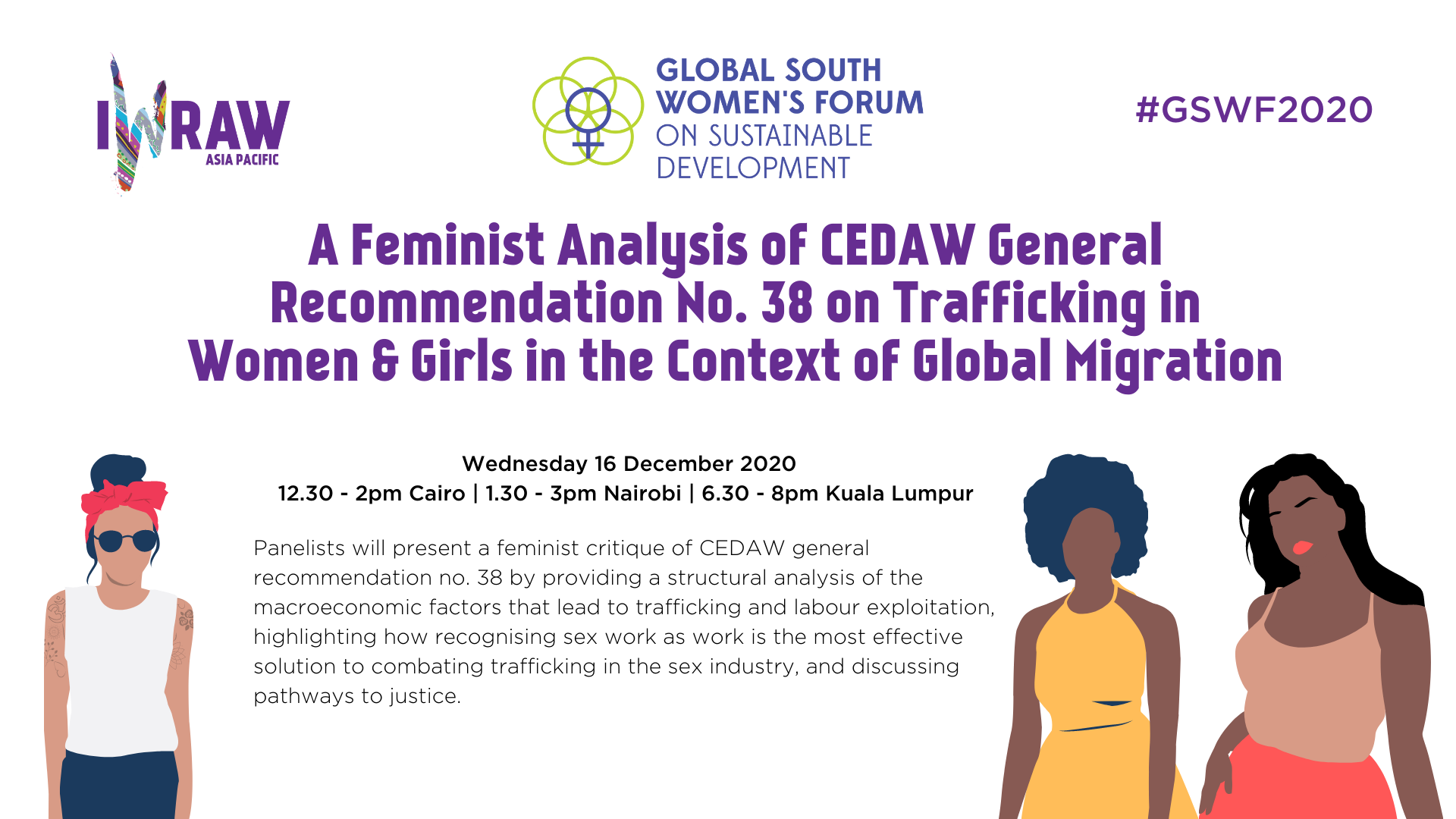
CEDAW General Recommendation 38 on trafficking in women and girls in the context of global migration was adopted in November 2020. It recognises that ‘globally dominant economic policies are the cause behind large-scale economic inequality between States and individuals that manifests as labour exploitation’. It also highlights that macroeconomic factors produce the conditions of economic injustice that disproportionately impact women. Despite the initial promise of this structural analysis, subsequent sections deviate to the familiar and dangerous tropes of the anti-trafficking world: discourage demand, prosecute those on the demand side, and link trafficking to ‘sexual exploitation’.
On 16 December 2020 at the Global South Women’s Forum, IWRAW Asia Pacific held a panel to present a feminist analysis of GR 38 with the aim of providing a structural analysis of the globally dominant neoliberal economic model that leads to trafficking and labour exploitation, highlighting that recognising sex work as work is the most effective solution to combating trafficking in the sex industry, and presenting innovative examples of opening pathways to justice for persons affected by trafficking and labour exploitation. Below is Part 1 of the transcript of that conversation, edited for clarity and concision.
What is your analysis of the General Recommendation? Based on your work and expertise, how does it impact rights holders?
Phelister Abdalla, Kenya Sex Workers Alliance
Globally, sex workers have advocated for – through the Global Network of Sex Work Projects and in partnership with women’s rights groups like IWRAW Asia Pacific – making sure that this General Recommendation removes the conflation between trafficking and sex work. Right now, it has not made any difference because the conflation between trafficking and sex work is still there. This makes the explanation of the GR very difficult because when it comes to the implementation of this GR in countries, the law will still be strict on us as ‘traffickers’. It will not understand that [we] have made the choice to be sex workers. This means that if the GR reaches a country-level implementation, the working environment of sex workers will no longer be safe because people will be looking at them as trafficked women and not as women who have decided to be sex workers.
The GR also talks about the ‘End Demand’ approach which speaks about criminalising clients of sex workers. Criminalising clients would make sex workers jobless since it would be very complicated for someone to operate as a sex worker. It would be risky for clients to come to the places or hotspots where they work. This would make their work complicated since this is something that many countries are actually going to implement. The GR excludes sex workers from all other recommendations because it becomes clear that if a sex worker is conflated with a trafficked woman, how does she fit into the other recommendations?
This recommendation has also made sex workers feel very disadvantaged, ignored, and disrespected because they have had conversations [about this GR] in different places. In Bangkok, sex workers sat down with different partners and drafted good recommendations that would contribute to this recommendation. At a meeting in Nairobi, the same thing was done again. Recommendations of only sex workers were sent to the CEDAW Committee, which the Committee decided not to look at. Sex workers question whether this was disrespectful and a denial of opportunities to women who are actually raising concerns which are very important to them as a community. This GR also denies sex workers the right to bodily autonomy and the right to make bodily choices as women. My voice as a woman has been shut down in this space. We have done a lot but there is no certainty as to what the right channel is for women to tell people that sex work is work. We have chosen to be who we are. We have exercised our own bodily autonomy and nobody is forcing us into this.
Radhika Coomaraswamy, former UN Special Rapporteur on violence against women, its causes and consequences
When I was Special Rapporteur on violence against women, it was when the convention was actually drafted, so I feel very emotionally invested in this issue. When I think of trafficking, especially from the Asian region, I think of the women I met, and two stories in particular. The first is the story of M from Nepal, who was a young girl in her village who had very abusive parents. When a young man came and said he was in love with her, she left Nepal with him secretly. She was taken to Poona and handed over to a brothel and she found herself on Falkland Road [red-light district in Mumbai]. Finally, she was so-called ‘released’ and went back to Nepal. When I met her, she had HIV and was not in a good condition. So that to me is a situation of sexual slavery. That is one Asian reality.
The other [story] is when I went to Calcutta and met the women of the Durbar Mahila Samanwaya Committee who were a sex workers’ union. They had just formed at that time; now they are quite a large union. They began around issues of working together on HIV and AIDS but now over time, they’ve got help in building up housing and education for their children, and they have done microfinance. They are a supportive union that deals with economic benefits for its members and participation. So we have these two models within Asia. We must realise we have a history from medieval times of trafficking and sexual slavery. After every war, there was sexual slavery. We also have the tradition of the courtesan which is in every piece of literature in South Asia. We would not have art and music in South Asia if it were not for the sex worker and the courtesan. That is a history we must own again. From those two realities, I look at GR 38.
There are some good points to GR 38, including the effects of the economic policies, some of the victims’ rights provisions, safe conditions of work, and safe migration, but I find four problem areas. The first is that the market model of demand and supply has been superimposed on a model of criminal accountability, which is what we deal with in cases of sexual slavery and trafficking. And I think these strategies [for] what is called curtailing demand, which may be okay in an ideal world, go against the lived reality of large numbers of women around the world. Some of the women choose sex work but for some of them, it is part of their survival strategy, whether it’s poverty or domestic abuse or war. Sometimes they can only work in domestic work, in factories, and in sex work. I have met women who did both. They did domestic work during the day, and at night they did sex work, for themselves and for their children.
We should respect the choices that women make with their bodies, but unless we change the macro system that eliminates poverty, violence against women, and war, we cannot eliminate people’s choices and survival strategies. We have to only focus on abuse and slavery-like conditions or arrangements, and not this massive sweep of demand curtailment and criminalising the process.
The second area I found problematic is that it loses focus between the distinction between migration and trafficking. Traffickers fish in the sea of migration, as they say, but it is important to understand the similarities and the differences. Legal migration, human smuggling, trafficking, these are all different realities, and the differences vary according to consent. They are united by an existential desire for all these women to migrate, but there are different levels of consent between trafficking, migration, and human smuggling. Therefore, I think it’s very important if we’re looking at human rights and recognising women’s subjectivity – after all, CEDAW is a human rights document – to have the issue of consent in centre place. Women have the right to their autonomy, they have the right to choose; and only against their consent, such as what happened with M, should the law step in. And I think unless we reclaim that human rights concern, which is actually the convention people think is flawed but is still structured around women’s right to choose, I think this refusal to focus on that [causes] migration and trafficking to collapse into each other in this General Recommendation.
What happens in this kind of thing when consent or right to choose is put aside, is that intermediaries and state officials then start making decisions for women, and those are not always in the women’s best interest or not what the women want. They can be deported, but they don’t really want to be deported, and various other things can happen to them. For example, I have been in many situations where women have been miserable at being rescued, because they had another desire and another decision for their lives, so this collapsing of migration and trafficking is, I think, a serious problem.
The third problem area is that we have the sense of an active intervening surveillance-oriented role for the state. My history initially began as protecting human rights defenders and I know that the state is not always benign, especially on migrants and people of different racial origins. I myself was once identified as a potential migrant worker who was being trafficked when I was younger. And it was not a pleasant experience. The immigration officers were not skilled at PR. I felt I was a suspect. So we have to be careful with this GR because it empowers everybody – immigration officials, health officials, labour officials, public servants, everyone – to basically spy on everyone to find out whether they have been trafficked, and that is not an appropriate response.
Women, migrant women especially, want to be invisible. So there should be a better understanding of the role of the state, that it is not a benign state that we are looking at. And when we are in partnership with the state as a human rights group, we have to be careful as to how we look at the state and how it intervenes.
The fourth problem area is I think there are some good provisions on labour, but as the first speaker said, sex work is not included in the labour category, so it basically eliminates large numbers of women all over the world as workers and sees sex work as inherently abusive and unequal. Given Asian histories and the space occupied by sex workers in Japan, in India, and all around Southeast Asia, this is forcing us to eliminate a whole part of our history and our culture. It’s based on a moral judgement about sex work, and in a diverse world where there are very different approaches to sex work, is it appropriate that you have a global document that does that?
Read part two, or watch the conversation in full on YouTube. Our thanks to Angie Hunt for transcription.

